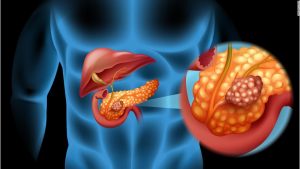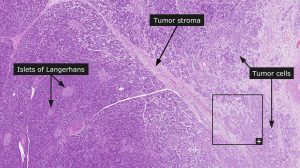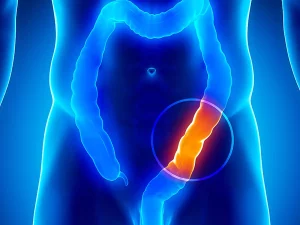Introduction Pancreatic cancer, a formidable adversary in the realm of oncology, originates from the abnormal growth of cells within the pancreas—an essential organ in the digestive system and blood sugar regulation. Often shrouded in silence, this malignancy poses a significant challenge as it tends to remain asymptomatic until reaching advanced stages, diminishing early detection opportunities.
Introduction
Unraveling the Complex Web of Pancreatic Cancer
Pancreatic cancer, a formidable adversary, originates from the abnormal growth of cells within the pancreas. This vital organ plays a pivotal role in digestion, secreting enzymes, and regulating blood sugar levels.

Image by: yandex.com
Understanding the Types
Dive into the subtle distinctions: Pancreatic ductal adenocarcinoma, the most prevalent type, often manages to elude early detection, leading to diagnoses at advanced stages. Understanding the nuances of different types is crucial for effective management.

Image by: yandex.com
Symptoms and Diagnosis
Shedding Light on Warning Signs: Pancreatic cancer is notorious for remaining asymptomatic until it reaches advanced stages, making early diagnosis challenging.
Identifying Risk Factors
Delving into the Potential Triggers:
- Smoking: A well-established contributor, smoking significantly elevates the risk.
- Family History: Genetic predisposition can substantially increase susceptibility.
- Diabetes: Individuals with type 2 diabetes may face an elevated likelihood.
- Age: Pancreatic cancer predominantly affects individuals over the age of 65.

Photo by: www.pexels.com
The Genesis of Pancreatic Cancer
Deciphering the Cellular Changes: Alterations in DNA dictate abnormal cell growth, culminating in the formation of tumors. Pancreatic ductal adenocarcinoma typically originates in the duct cells of the pancreas.
Complications on the Horizon
Navigating the Challenges as Pancreatic Cancer Progresses:
- Weight Loss: The cancer’s voracious energy consumption leads to significant weight loss.
- Jaundice: Blockage of the bile duct causes yellowing of the skin and eyes.
- Pain: Tumor growth may press on abdominal nerves, inducing severe pain.
- Bowel Blockage: Invasive growth into the duodenum obstructs the flow of digested food.

Image by: yandex.com
Exploring Treatment Avenues
Understanding the Spectrum: Treatment options, ranging from surgery and chemotherapy to radiation therapy, are tailored to the specific extent of pancreatic cancer. A personalized approach is vital for effective management.
Prevention and Screening Strategies
Empowering Individuals for Proactive Measures:
Screening for High-Risk Individuals
- MRI and Ultrasound: Advanced imaging tests play a crucial role in early detection.
- Annual Screening: Recommended for individuals with a high risk of pancreatic cancer.
Genetic Testing for Cancer Risk
- Family History Assessment: Identifying inherited risks.
- Genetic Counseling: A pivotal step in exploring genetic testing options.

Image by: yandex.com
Lowering the Risk Through Lifestyle Modifications
Taking Control of Health:
- Quit Smoking: Seek support for smoking cessation, a critical step in reducing pancreatic cancer risk.
- Maintain a Healthy Weight: Regular exercise, coupled with a balanced diet rich in vegetables, fruits, and whole grains, can contribute to risk reduction.

Image by: yandex.com

















Leave a Comment
Your email address will not be published. Required fields are marked with *